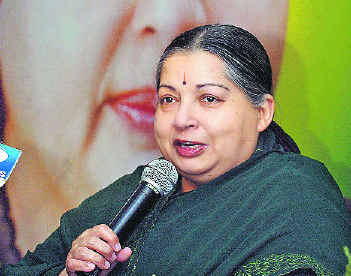Jayalalithaa takes Centre to task of US-India nuke deal
 Chennai/Bangalore, Sept 11 : Former Tamil Nadu Chief Minister and president of the All India Anna Dravida Munnetra Kazhagam (AIADMK) J. Jayalalithaa has charged the Central Government with compromising the country''s sovereign right to conduct further atomic tests.
Chennai/Bangalore, Sept 11 : Former Tamil Nadu Chief Minister and president of the All India Anna Dravida Munnetra Kazhagam (AIADMK) J. Jayalalithaa has charged the Central Government with compromising the country''s sovereign right to conduct further atomic tests.
Reacting to the 45-member Nuclear Suppliers Group’s (NSG) decision on Saturday to lift a 34-year-old ban on nuclear trade with India, she said: "It is very clear that it is a sellout on the part of Congress-led United Progressive Alliance (UPA) Government. It is quite clear that according to this agreement there will be no more nuclear tests. It means, India has bargained its sovereign right."
Eminent space scientist U. R. Rao, however, said the deal is good for India despite the fact that further atomic tests could invite wrath of the international community.
"Yes, we do have a capability and some people feel that we don''t need the tests. I am not sure of that because any time a new technology comes that will require some tests, but not withstanding. If you look at totality of the nuclear system, it has seen rather as deterrent and therefore we have the minimum deterrent that we have built up. Because nuclear things are there people are afraid. Therefore in a way it has acted as a deterrent and that would continue…," he said in Bangalore.
On Tuesday, Australian Foreign Minister Stephen Smith clarified that Canberra would not sell uranium to India even after the NSG waiver since New Delhi had not acceded to the Nuclear Non-Proliferation Treaty (NPT) and the Comprehensive Test Ban Treaty (CTBT).
Rao said the NSG could still deny India critical technologies but added that the deal is the best New Delhi could have hoped for, given its security interests and stated position on total disarmament.
"Only five nuclear powers are the members of the Security Council. And unfortunately having come late, we are not in the definition of a nuclear power. Even the de-facto we have, but we are not a nuclear power. So, we have this problem but at least things have opened up and we can receive certainly technology, even though much has been said about technology and I don''t think that very sensitive technology would be ever given," Rao said.
The NSG waiver paves the way for the controversial U. S.-Indian atomic energy deal that is still to be ratified by the U. S. Congress.
Washington says the fuel and technology deal would forge a strategic partnership with the world''s largest democracy, help India meet rising energy demand in an environmentally sound way and open a nuclear market worth billions of dollars. (ANI)
